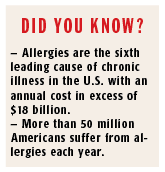Spring allergies have sprung
Published 12:52 pm Thursday, April 12, 2018
Allergy season is here.
An allergy is anything your body has an allergic response to, Ashley Cornett, a registered nurse at Winchester’s Allergy, Asthma and Sinus Center, said.

A lot of allergies have a genetic predisposition, Cornett said. However, allergies can develop over time or can range in severity as a person ages.
“Usually as you age, allergies do get worse,” Cornett said.
Things in your immune system can set allergies off, she said. Women who are pregnant can develop allergies or even people who have recently undergone surgery.
Increased exposure — such as dusting, mowing or weeding a garden — as well as weather changes can cause flare-ups.
Drier climates don’t cause as many allergies, but right here along the Ohio Valley is probably the worst, Cornett said.
Seasonal allergy symptoms can include pain in the ear, nasal congestion, loss of smell, redness, runny nose, post-nasal drip, sneezing, stuffy nose, itchiness, puffy eyes, redness, watery eyes, trouble breathing, wheezing, coughing, fatigue, headache, itching, phlegm or throat irritation.
Cornett said AASC could determine whether something is an intolerance or an allergy by doing a scratch test. She said a few drops of the purified allergen are gently pricked on a patient’s back, if the area puffs up, then the patient is allergic to the allergen tested. The test is usually done to identify allergies to pet dander, dust, pollen, foods or dust mites.
AASC tests for 129 different allergens as well as about 80 chemicals, Cornett said.
To treat allergies, Cornett said there are over the counter medicines for allergies — such as Zyrtec, Claritin and Allegra — as well as nasal sprays or inhalers if necessary. Cornett said the best treatment is allergy shots.
“Allergy shots desensitize you to things you are allergic to,” Cornett said. “After we test (the patient), we make an allergy shot serum that is specific to the patient.”
Cornett said it’s important for people with allergies to watch their symptoms especially if it leads to breathing problems, so starting treatment early in the season can be helpful.
Kelley Hawkins, a nurse practitioner at AASC, said it’s all about finding what works for each patient, because people can have multiple allergies and each person may experience different symptoms, and they may have various factors that cause flare-ups. She also said anyone at any age could have an allergy.
Hawkins said there may come a point when medication doesn’t help with symptoms, and that’s when it’s critical to make an appointment with a center like AASC to try the shot treatment.
As far as day to day, there’s no cure for allergies.
However, people can take a few extra steps to help decrease the amount of pollen to which they may be exposed.
Such measures can include taking your shoes off inside, washing your hands and face after you come in from being outside, showering or changing your clothes after being outside, vacuum often, dust often with microfiber cloths, wash sheets and bedding regularly and even wash pillows.






